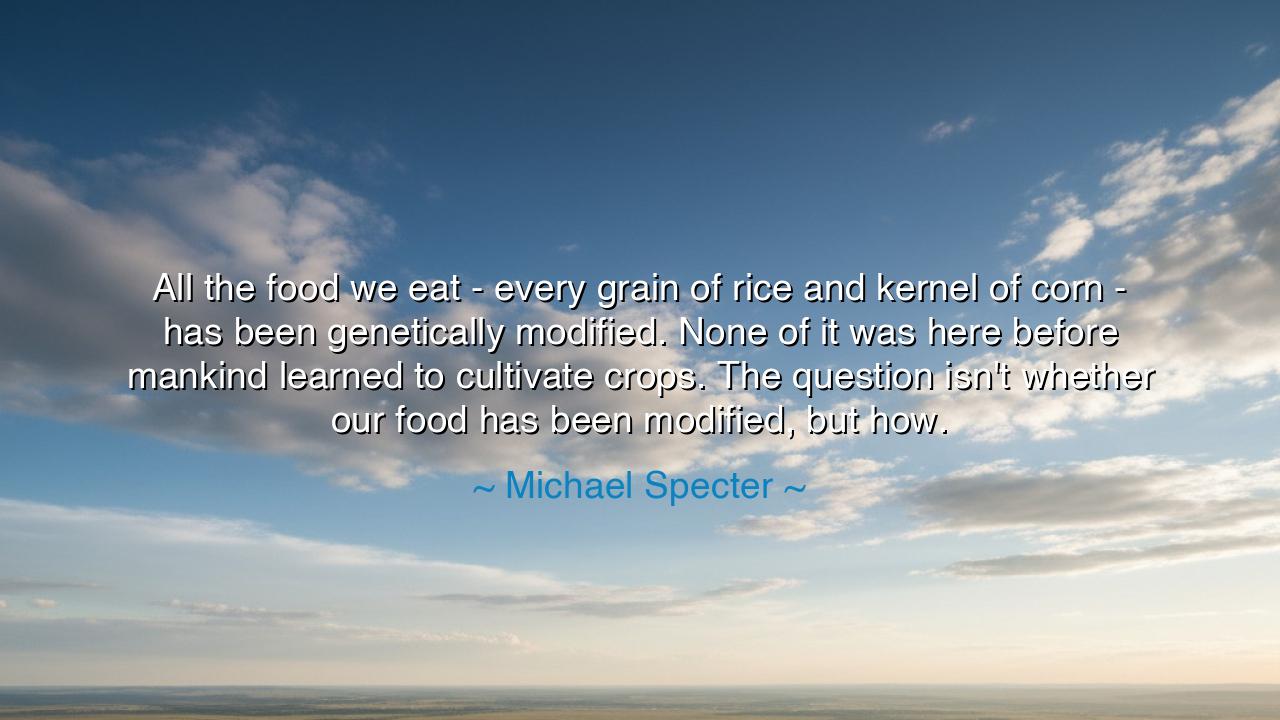
All the food we eat - every grain of rice and kernel of corn -
All the food we eat - every grain of rice and kernel of corn - has been genetically modified. None of it was here before mankind learned to cultivate crops. The question isn't whether our food has been modified, but how.






Host: The room is calm, the evening light casting soft shadows across the floor. Outside, the world continues its usual rhythm, but inside, the atmosphere feels more reflective, as though a deeper conversation is about to unfold. Jeeny sits at the table, her fingers tracing the rim of her mug, her expression thoughtful. Jack stands near the window, arms crossed, watching the street below.
Jeeny: (her voice gentle, yet filled with curiosity) “You ever think about how much the food we eat has changed over time? How what we consider ‘natural’ now is actually the result of centuries of human influence, and how even the simplest foods we eat have been altered in some way?”
Jack: (glancing over at her, his voice dry, but intrigued) “Changed over time? Yeah, I get that. We think of food as something pure and natural, but it’s all been shaped by us in one way or another. What got you thinking about it?”
Jeeny: (nodding slowly, a small smile forming as she shares her thought) “I was thinking about something Michael Specter said: ‘All the food we eat - every grain of rice and kernel of corn - has been genetically modified. None of it was here before mankind learned to cultivate crops. The question isn’t whether our food has been modified, but how.’ It really made me reflect on how much of what we eat has been shaped by human intervention, long before the term ‘genetically modified’ became a buzzword.”
Jack: (pauses, considering her words carefully) “So, he’s saying that the idea of modifying food isn’t new at all? That everything we eat, from the rice we have with dinner to the corn in our cereal, has been genetically altered in some way by human hands, ever since we started farming?”
Jeeny: (smiling more deeply now, her eyes steady as she explains further) “Exactly. Specter’s point is that when we think about genetically modified food today, we often think of something unnatural or recent. But the truth is, humans have been modifying the food we grow for thousands of years. From selective breeding to crop cultivation, all the food we eat has been shaped by human hands. The question now isn’t whether food is modified—it’s how it’s been modified and whether those changes are beneficial or harmful.”
Host: Jeeny’s words seem to settle in the room, a quiet realization about the long history of food cultivation and modification. Jack stands still, his expression softening as he processes the deeper implications of Specter’s statement. The world outside continues its rhythm, but inside, the conversation feels grounded in a new understanding of food and agriculture.
Jack: (his voice quieter now, almost reflective) “I see what he means. We’ve always altered the food we eat, whether it’s through selective breeding or crop cultivation. What’s changed now is the scale and the methods we use to modify it. We’re not just growing plants anymore—we’re directly manipulating their genetic makeup.”
Jeeny: (nodding, her voice calm, yet filled with quiet insight) “Exactly. The idea that our food is ‘untouched’ by human influence is a myth. But the ways in which we modify food today—through genetic engineering—raise new questions about sustainability, ethics, and health. We’ve been modifying food for centuries, but now, the question is how we do it and whether the changes are in harmony with nature and our needs.”
Jack: (pauses, his expression thoughtful as the idea sinks in) “It’s interesting, isn’t it? How we think of genetic modification as something new or controversial, but in reality, humans have been doing it for generations. It’s the technology and methods that have evolved, not the idea itself.”
Jeeny: (smiling warmly, her voice gentle, yet filled with clarity) “Exactly. And that’s why it’s so important to consider the implications of what we’re doing now. We’ve always shaped the food we eat, but we need to be mindful of how we modify it today. It’s not about whether food has been changed, but whether those changes are truly in our best interest.”
Host: The room feels lighter now, as though the conversation has opened up a deeper understanding of food, agriculture, and human influence. Jack turns from the window, his posture more relaxed, his thoughts clearly reflecting on the evolution of food cultivation and the implications of modern genetic modification. Jeeny watches him, content in the knowledge that sometimes, understanding the past helps us navigate the future. The world outside continues its rhythm, but inside, there’s a shared recognition that the real question isn’t whether food is modified—it’s how, and whether those modifications serve the well-being of both people and the planet.






AAdministratorAdministrator
Welcome, honored guests. Please leave a comment, we will respond soon